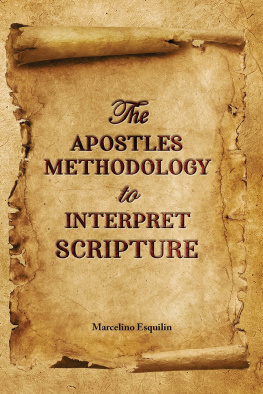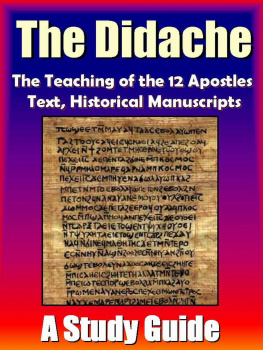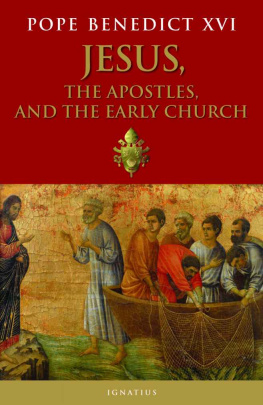
BibleTalkBooks
14998 E. Reno
Choctaw, OK 73020
Copyright 2021 byBibleTalk.tv
ISBN: 978-1-945778-94-0
Unless specified otherwise, allquotes are from the English Standard Version (ESV).
The Holy Bible, EnglishStandard Version. ESV Text Edition: 2016. Copyright 2001 byCrossway Bibles, a publishing ministry of Good NewsPublishers.
TABLE OFCONTENTS
1. Introduction to theApostles
2. Peter: First Among theTwelve
3. Andrew: A Brother AmongBrothers
4. James and John: Sons ofThunder
5. Philip and Nathanael: Friends toAll
6. Matthew and Thomas: Two MenTransformed
7. James the Less, Simon the Zealot,and Judas Not Iscariot: Faces in the Crowd
8. Judas Iscariot: A LifeWasted
9. Matthias and Paul: Transition tothe Future
10. Faith: A Matter ofChoice
1.
Introduction to TheApostles
Not long after Jesus began Hisearthly ministry and as the crowds following Him began to grow, Hecalled out twelve men and designated them as apostles. From ourview, there was nothing extraordinary about these men. Some havedescribed these men as extraordinary in their ordinariness. Theywere not selected because of their social status, education,religious, or political connections. They were simply ordinarypeople, just like us.
Our Lord knew the wealth of rawmaterials possessed by each of these men. He knew what they couldbecome. Except for Judas Iscariot, the one who betrayed Him, theylearned to turn their lives over to Him.
That is the overall message for us.We can do extraordinary things for the Master as we learn to turnour lives over to Him. Each of us has been gifted by God to turnwhat we might think of as ordinary into the extraordinary. Theextraordinary things we do involve showing Jesus to others andhelping them enter into a relationship with Him. That is a criticaltask for us as disciples. And just like these men, we learn thatthe power is not in us, but in God and seen through us as we eachturn more and more of our lives over to Him.
In Acts 2:42-47 we see the earlyactions of the church just after it had been established onPentecost Sunday. Of special note is the statement in verse42:
And they devoted themselves tothe
apostles teaching
We continue today to dedicate ourlives to our Lord and apply the apostles teachings. In this seriesof lessons, we are going to look at these men. We will look attheir strengths and weaknesses and what we can learn fromeach.
In this first lesson we willlearn:
The Difference BetweenDisciple and Apostle
In the gospels the term discipleis used to describe both followers of Christ in general and thetwelve apostles specifically. A disciple is a common term forsomeone that is a learner, pupil, student or follower of a specificteacher. It is also used to demonstrate agreement and acceptance ofthe teacher as leader. Disciples would attach themselves to ateacher, even travel with this teacher for a while. Some of thedisciples of Jesus traveled with Him in the region where He wasteaching for a time. Others, like the apostles, traveled with Himcontinually.
Jesus was certainly not the firstto have disciples. Discipleship was a common education model of thetime. The value in this educational model is that it lends itselfto learning by experience. This is where the master, Jesus in thiscase, was able to apply real-world examples and experiences to helpthe disciples achieve deeper understanding. Evidence of this is inhow Jesus would bring in examples from nature (Matthew 6:25-34) andthe many parables where He drew from life experiences and commonknowledge to teach deeper truths.
In Matthew 28:18-20, in what iscalled the great commission, Jesus told the apostles, and us byextension, to make other disciples (followers) for Him. Our effortsresult in disciples, or followers for Christ, not forourselves.
The word Apostle, on the otherhand, means the sent out or the sent ones. An apostle is anofficial representative speaking with the authority on behalf ofthe one who sent him. Jesus provided these men with knowledge,additional power, and authority to fulfill their role.
Today, each of us can (must) becomea disciple of Jesus, but we cannot become His apostle. Theseinitial twelve, and later Matthias and Paul, were the only onesappointed to this role. There were some people at that time andthere are some today who claim to be apostles in the same context.They should heed Pauls warnings:
For such men are falseapostles, deceitful workmen, disguising themselves as apostles ofChrist. And no wonder, for even Satan disguises himself as an angelof light. It is no surprise if his servants, also, disguisethemselves as servants of righteousness. Their end will correspondto their deeds.
- 2 Corinthians 11:13-15
How Jesus Selected the
Twelve Apostles
We read the details of how Jesusprepared Himself and selected the Twelve in Mark 3:13 and Luke6:12. Luke begins with the expression, In these days. This islike Pauls expression from Galatians 4:4, But when the fullnessof time had come. This clearly indicates events were on ourLords timeline and fully under His control. Scholars estimate thisoccurred approximately two years before His crucifixion so therewas a time of Jesus teaching a larger group of disciples and thenHis focus on the Twelve who would serve as apostles as His ministryprogressed.
Luke 6:12 records that Jesusisolated Himself with a prayer to God. Imagine that time formoment. Here is Jesus, the Son of God, praying to the Father, andno doubt in the presence of the Holy Spirit. This would have been aspecial time seeking the wisdom and assurance through thisinter-Trinitarian communion. This should remind us clearly of ourLords prayer in John 17 as He prepares Himself for His torture anddeath (see also Matthew 26:36-44). In this prayer Jesus prays forthe apostles specifically, and us as well.
As we see in the record of thecalling of the apostles in the gospels (not including John), aftera night of prayer Jesus called His disciples together as a group.From that larger group He selects the twelve and names them asapostles. He had already offered some of the men a personalinvitation to follow Him, but up to this point, they were just apart of the larger group of disciples.
It is a good question to ask whyJesus selected twelve. What is significant about that number? Mostscholars see this number as symbolic of the twelve tribes of Israelthat formed the Jewish nation. It further can symbolize Gods newkingdom. Later, as the disciples were waiting for the arrival ofthe Holy Spirit following the ascension of Jesus, they recognizedthe importance of this number as they selected Matthias to replaceJudas (Acts 1:12-26).
Similarities andDifferences
The apostles are listed in thegospels of Matthew, Mark, and Luke, but not in John. John gives usdetails about the activities and events involving many of theapostles. The apostles are also listed in Acts but obviously do notinclude Judas Iscariot since he had already taken his lifefollowing his betrayal of Jesus.
The listings of the apostles arearranged in three groups of four and in descending order,apparently based on their level of closeness with Jesus. Thelisting seems to reflect the details, or lack of details of theirlives during the ministry of Jesus. This is not to say any wereineffective or insignificant but reflects the way the gospelwriters chose to portray them.
Next page










